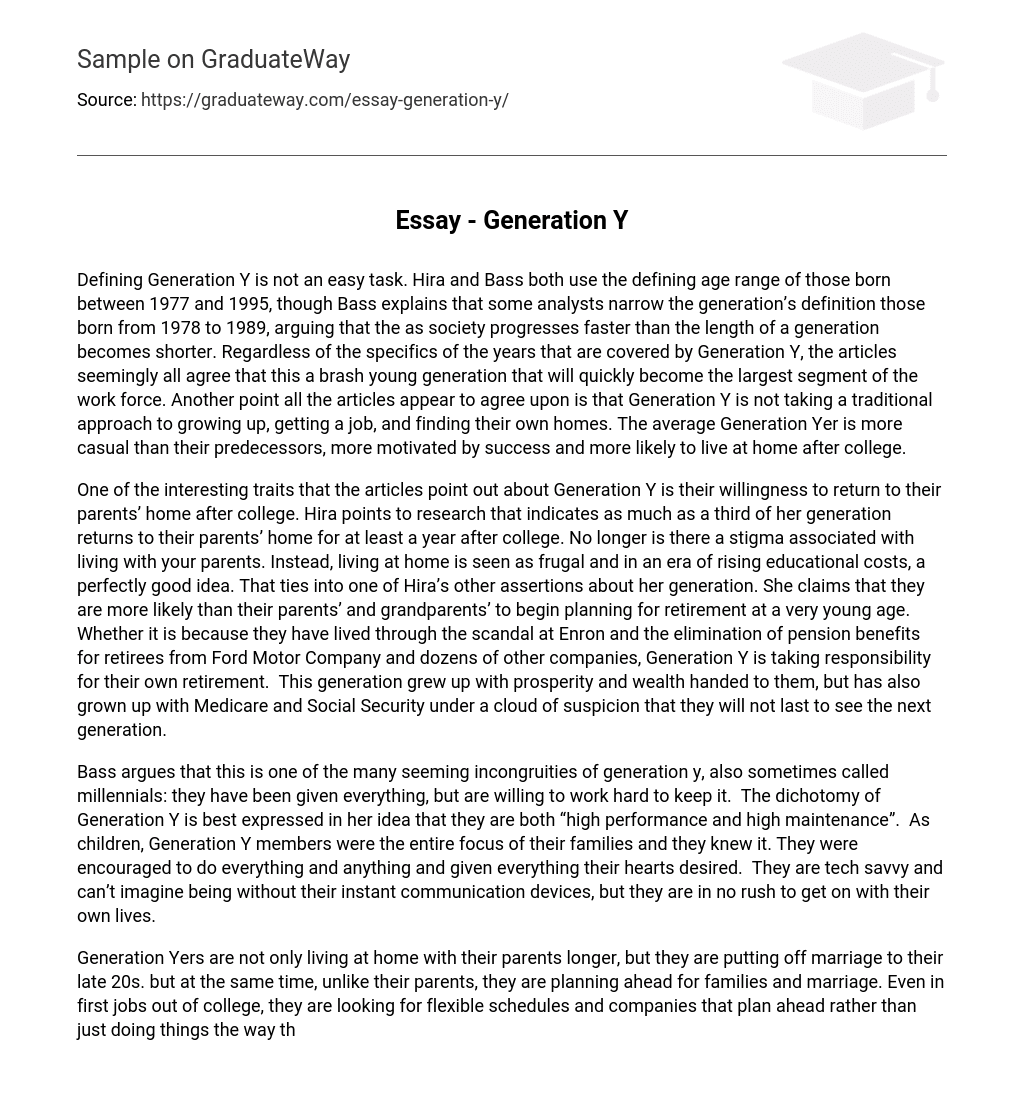Defining Generation Y is not an easy task. Hira and Bass both use the defining age range of those born between 1977 and 1995, though Bass explains that some analysts narrow the generation’s definition those born from 1978 to 1989, arguing that the as society progresses faster than the length of a generation becomes shorter. Regardless of the specifics of the years that are covered by Generation Y, the articles seemingly all agree that this a brash young generation that will quickly become the largest segment of the work force. Another point all the articles appear to agree upon is that Generation Y is not taking a traditional approach to growing up, getting a job, and finding their own homes. The average Generation Yer is more casual than their predecessors, more motivated by success and more likely to live at home after college.
One of the interesting traits that the articles point out about Generation Y is their willingness to return to their parents’ home after college. Hira points to research that indicates as much as a third of her generation returns to their parents’ home for at least a year after college. No longer is there a stigma associated with living with your parents. Instead, living at home is seen as frugal and in an era of rising educational costs, a perfectly good idea. That ties into one of Hira’s other assertions about her generation. She claims that they are more likely than their parents’ and grandparents’ to begin planning for retirement at a very young age. Whether it is because they have lived through the scandal at Enron and the elimination of pension benefits for retirees from Ford Motor Company and dozens of other companies, Generation Y is taking responsibility for their own retirement. This generation grew up with prosperity and wealth handed to them, but has also grown up with Medicare and Social Security under a cloud of suspicion that they will not last to see the next generation.
Bass argues that this is one of the many seeming incongruities of generation y, also sometimes called millennials: they have been given everything, but are willing to work hard to keep it. The dichotomy of Generation Y is best expressed in her idea that they are both “high performance and high maintenance”. As children, Generation Y members were the entire focus of their families and they knew it. They were encouraged to do everything and anything and given everything their hearts desired. They are tech savvy and can’t imagine being without their instant communication devices, but they are in no rush to get on with their own lives.
Generation Yers are not only living at home with their parents longer, but they are putting off marriage to their late 20s. but at the same time, unlike their parents, they are planning ahead for families and marriage. Even in first jobs out of college, they are looking for flexible schedules and companies that plan ahead rather than just doing things the way they have always been done. Hira points out using her case studies that Generation Y is intent on enjoying their time off work and making their time at work as useful as possible. They are not interested in working 60 hours for a job that could be done in 40 if it were done differently; they are not interested in long commutes when they can work from home; and they are not interested in companies that don’t treat all the their employees equally. Hira argues that Generation Y is so used to be exposed to different cultures and different viewpoints that they take it for granted that all viewpoints should be accepted equally. Having spent their formative years exposed to an international culture, Generation Y has come to expect it and is offended when they find that the grown up world of their parents is not so accepting.
Generation Y is the ultimate combination of slackers and over-achievers. They do not see the need to wear business formal clothes any time and firmly believe that business casual should include piercings and flip-flops, Hira argues. And, they are adopting a new way of working. Hira and many others of her generation work from home and “slave” over a computer while playing with the cat or painting their toenails. Many members of Generation Y believe in instant communication, but delayed gratification, understanding the need to save for a house rather than splurge on the best apartment in town. Living at home or with roommates is an alternative to outrageous expenses and a way to be able to pay their student loans. In essence, Generation Y is like a spoiled child that can and does work for its spoils. Generation Y is giving and willing to share what they have, knows it has been given a better opportunity than most, and is thankful for at all.
Generation Y is self-confident and aware of their own abilities, yet in need of constant praise and reassurance. They are not adjusting well to their father’s work place and as a result the workplace is adjusting to them. Employers need Generation Y and are making the changes necessary to appeal to the new generation. That means flexible work weeks, in office gyms and salaries that seem outrageous to older generations. They expect and demand companies that work in the modern age and work with the modern age. The idea of not being able to receive calls or check emails while at work is offensive and outdated. In short, Generation Y is revolutionizing the work world and other generations simply better try to keep up.





